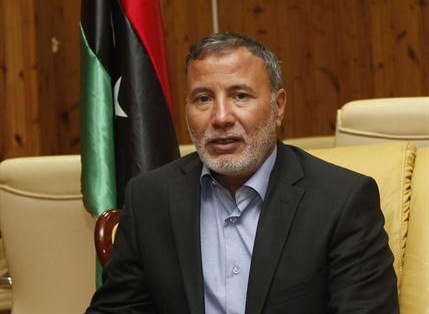By George Grant.
Tripoli, 27 June:

Defence Minister Osama Juwaili has strongly criticised the NTC for “failing to consult with anybody” when passing . . .[restrict]laws and restricting his role to “signing the plans of the chief of staff”, Yusef Mangoush.
The minister revealed his frustrations to the Libya Herald in response to criticism of the defence ministry’s apparent absence from efforts to resolve recent conflicts that have taken place around Kufra, Sebha and in the Nafusa Mountains.
“I was stripped of my powers when the NTC passed Law 11”, Juwaili said. “Now my job is just to sign the plans of the chief of staff”.
Although Law 11 stipulates that the defence minister has overall responsibility for military matters in Libya, effective decision-making powers are vested in the chief of staff, who is “directly responsible for the technical aspects of organising, preparing, training, leading, managing and maintaining the combat readiness of the Libyan armed forces”. The law was passed on 13 February 2012.
The military has been present in Kufra and Sebha for several months in an effort to restore order and was deployed to the Zintan-Shagiga region of the Nafusa Mountains on 16 June. Though Sebha and Zintan-Shagiga are now reportedly calm, fresh clashes were reported in Kufra yesterday, leaving a number of people wounded. The fighting across all three areas has resulted in the loss of several hundred lives, with hundreds more wounded.
Juwaili also emphasised that the government as a whole was restricted by the way the NTC operates and passes new laws. “The NTC are in the habit of issuing laws without first referring to the government or to experts. They are failing to consult with anybody”, he said. “These laws often conflict with the work of the government and restrict its powers”.
The minister chose to cite again Law 11 as an example. “The NTC sent me a letter requesting us to develop a law to govern the operations of the defence ministry and the armed forces, and said we had just three days to do this. On the very same day, they passed Law 11 which did just that, so what was the point of asking me at all?”
The NTC did not respond to repeated requests for comment on the minister’s criticisms.
Prior to becoming defence minister last November, Juwaili was head of the Zintan Military Council, a factor widely believed to have influenced his appointment. At the time, Zintan retained control of Tripoli international airport, and Saif Al-Islam Qaddafi is still being held in the town.
Over the past few months it has become clear that the delineation of power between the NTC and the transitional government remains vague, with the NTC frequently operating in an executive as well as a legislative capacity.
Although the Constitutional Declaration of 3 August 2011 vests executive power in the transitional government, it also stipulates that the NTC “is the supreme power in the State of Libya and shall undertake the works of the supreme sovereignty including legislation and laying down the general policy of the State”.
The declaration also declares the government to be “liable before the Interim Transitional National Council for carrying out the general policy of the State in accordance with the instructions and directions of the Interim Transitional National Council”.
Ensuring that the role of both the government and the legislature are clearly defined will be of central importance for those tasked with drawing up Libya’s permanent constitution after the 7 July elections, as will agreement between the National Conference and the new government during the interceding period. [/restrict]










